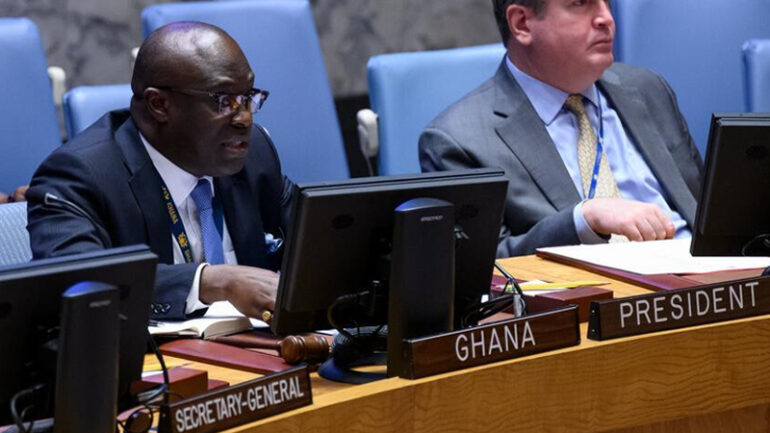United Nations Security Council Briefing and Consultations on Libya

UNITED NATIONS SECURITY COUNCIL BRIEFING AND CONSULTATIONS ON LIBYA
I have the honour to deliver this statement on behalf of the A3 – namely, Gabon, Ghana and Kenya. We thank the Special Representative of the Secretary-General, Mr. Abdoulaye Bathily for his briefing and welcome the participation of Ambassador Taher El Sonni, Permanent Representative of Libya.
Distinguished Colleagues,
When the Security Council met on 24th October for a briefing on the situation in Libya, we welcomed the stability and space that a substantive year-long renewal would provide the Special Representative of the Secretary-General to meaningfully engage in the peace process. We also welcomed the 60 days reporting requirement that the Security Council had requested of the Secretary-General in resolution 2656. We still believe that it would be more meaningful to allow sufficient space for the Special Representative of the Secretary-General to engage in-depth in the peace process. A briefing from such a process would thereafter help us to hold a more impactful discussions on the file.
This notwithstanding, we acknowledge the updates provided by the SRSG today and encourage his continued efforts in reaching out to all parties and stakeholders and helping them to coalesce their commitment and action towards peace in Libya.
We acknowledge the magnitude of work that lies ahead in view of the continued political stalemate. We urge that as mediation continues, national dialogue and comprehensive and inclusive national reconciliation are mainstreamed throughout the peace process. The African Union and our governments remain on hand to support Libya in this regard.
Colleagues,
The members of the A3 are concerned about the recurrent outbreaks of violence among rival armed groups in and around Tripoli that continue to claim lives and injure many. We call on all armed groups to cease their violence, especially within areas of civilian residence and activities. We also call on all Libyan leaders particularly those under whose control the armed groups fall, to exercise maximum restraint in their utterances which influence the conduct of these armed groups. Foreign forces and fighters as well as mercenaries in Libya are a key contributor to the standoff between armed militias. Their continued presence in Libya is in direct contravention of Security Council resolutions including resolution 2656. They also continue to constitute a grave security threat to the neighbouring States and the Sahel region. Therefore, we demand their immediate withdrawal. We also emphasise that such withdrawal is done in close coordination with neighbouring States, and corresponding disarmament, demobilisation and reintegration, to avoid the export of conflict into the region.
We support the full implementation of the Ceasefire Agreement of October 2020 and the 5+5 Joint Military Commission Action Plan of 8th October 2021 in this regard.
We urge the political leaders and the people of Libya to understand that there cannot be a military solution to the conflict. It is critical that they commit to the political process which must have all interest groups in society including women and the youth meaningfully involved. We encourage continued dialogue to help address all impediments to holding free, fair and transparent elections as desired by Libyans, in order to have a credible unified government, duly elected by the people. Such elections cannot be achieved other than on a firm constitutional basis. We, therefore, urge that the UN and other international partners, through the UN, extend technical support for the development of the constitutional framework. We encourage similar efforts in the economic development of Libya through the reunification of economic institutions. In this regard, we call for more attention to be paid to ensuring that the oil sector, as the economic mainstay for Libya, is guarded against undue political and foreign interference.
Colleagues,
Our meeting in October was in the wake of the horrifying wash-up of bodies of 15 migrants in Sabratha. We continue to wake up to a steady increase in the numbers of African migrants facing untold atrocities while fording the Mediterranean to Europe. This month alone, about 600 migrants were stranded on the Mediterranean for two weeks in search and rescue vessels. Among them were children travelling alone and sick people, yet they were being denied disembarkation by some European governments. While vulnerable people are being turned away at borders, there is a growing appetite to fund African border and migration management programmes without corresponding systems of accountability. Channels of information sharing in support of such cooperation are also wanting in transparency. We call for closer monitoring by the United Nations of the resources and information channels used in this regard and would be expecting more information necessary to better address this issue. We reiterate our demand that refugees, migrants and asylum seekers be treated with dignity as a basic requirement of international law and consistent with our call in all other conflict situations worldwide.
Finally, we reaffirm our respect for Libya’s territorial integrity and sovereignty and our support for a truly-Libyan led and owned peace process.
Thank you.
